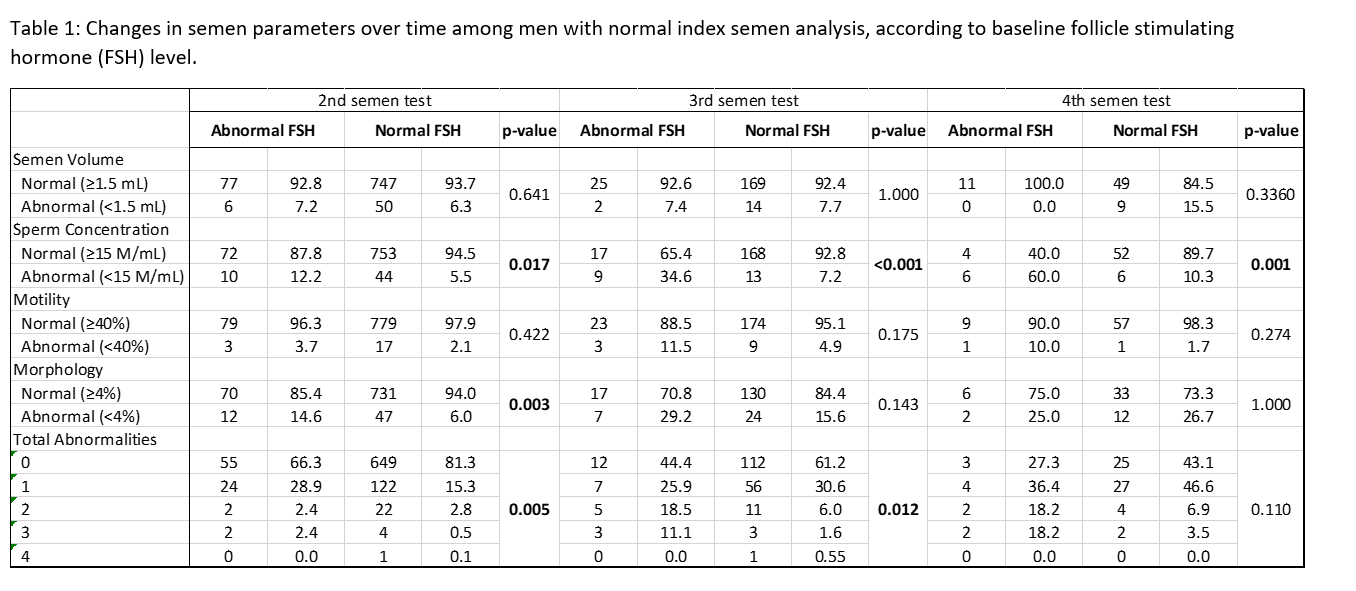Back
Poster, Podium & Video Sessions
Podium
PD09: Infertility: Epidemiology & Evaluation I
PD09-06: Elevated Follicle Stimulating Hormone (FSH) predicts decline in semen parameters among men with normal index semen analysis
Friday, May 13, 2022
1:50 PM – 2:00 PM
Location: Room 252
Richard Fantus*, Minh Pham, Cecilia Chang, Justin Dubin, Robert Brannigan, Joshua Halpern, Chicago, IL

Richard Fantus, MD
Urologist
University of Chicago
Podium Presenter(s)
Introduction: A significant proportion of men presenting for fertility evaluation have elevated follicle stimulating hormone (FSH) despite normal semen parameters. Since elevated FSH is presumed to be indicative of impaired spermatogenesis, the significance of this finding in men with normospermia remains unknown. We hypothesized that men with normospermia and elevated FSH were more likely to experience decline in semen parameters over time.
Methods: We performed a retrospective analysis of men with presenting for fertility evaluation throughout an integrated healthcare system. Men with all normal semen parameters according to the World Health Organization 5th edition were included. Men without at least one follow-up semen analysis (SA) after the index SA were excluded. Men were stratified according to baseline FSH as normal ( < 7.6 mIU/mL) vs elevated ( = 7.6 mIU/mL). We examined the proportion of men who subsequently had an SA abnormality at the 2nd, 3rd, and 4th SA according to baseline FSH levels. Chi-squared test was used to compare the proportion of men with abnormal SA at each follow-up.
Results: Among 879 men with normal semen parameters at index SA, 82 (9.3%) had elevated FSH at the time of index SA. By the second SA, 10 (12.2%) of men with elevated FSH had declined to abnormal sperm concentration whereas just 44 (5.5%) of men with normal FSH had declined (p=.017). By the third SA, 34.6% (9/26) of men with elevated FSH had declined to oligospermia whereas just 7.2% (13/181) of men with normal FSH had declined (p < 0.001). By the fourth SA, 60.0% (4/10) of men with elevated FSH had declined to oligospermia whereas just 10.3% (6/58) of men with normal FSH had declined (p=0.001). When considering aggregate semen parameters, a smaller proportion of men with elevated FSH had a normal SA (concentration, motility, and morphology) compared to men with normal FSH at the second, third, and fourth SA (p=0.005, p=0.012, and p=0.1095, respectively).
Conclusions: Men with normal semen parameters and elevated FSH are more likely to experience serial decline in sperm concentration and overall semen parameters compared to men with normal FSH. Patients with elevated FSH should be counseled regarding potential decline and may consider short interval repeat semen analyses for the duration of attempts to conceive.
Source of Funding: None

Methods: We performed a retrospective analysis of men with presenting for fertility evaluation throughout an integrated healthcare system. Men with all normal semen parameters according to the World Health Organization 5th edition were included. Men without at least one follow-up semen analysis (SA) after the index SA were excluded. Men were stratified according to baseline FSH as normal ( < 7.6 mIU/mL) vs elevated ( = 7.6 mIU/mL). We examined the proportion of men who subsequently had an SA abnormality at the 2nd, 3rd, and 4th SA according to baseline FSH levels. Chi-squared test was used to compare the proportion of men with abnormal SA at each follow-up.
Results: Among 879 men with normal semen parameters at index SA, 82 (9.3%) had elevated FSH at the time of index SA. By the second SA, 10 (12.2%) of men with elevated FSH had declined to abnormal sperm concentration whereas just 44 (5.5%) of men with normal FSH had declined (p=.017). By the third SA, 34.6% (9/26) of men with elevated FSH had declined to oligospermia whereas just 7.2% (13/181) of men with normal FSH had declined (p < 0.001). By the fourth SA, 60.0% (4/10) of men with elevated FSH had declined to oligospermia whereas just 10.3% (6/58) of men with normal FSH had declined (p=0.001). When considering aggregate semen parameters, a smaller proportion of men with elevated FSH had a normal SA (concentration, motility, and morphology) compared to men with normal FSH at the second, third, and fourth SA (p=0.005, p=0.012, and p=0.1095, respectively).
Conclusions: Men with normal semen parameters and elevated FSH are more likely to experience serial decline in sperm concentration and overall semen parameters compared to men with normal FSH. Patients with elevated FSH should be counseled regarding potential decline and may consider short interval repeat semen analyses for the duration of attempts to conceive.
Source of Funding: None


.jpg)
.jpg)